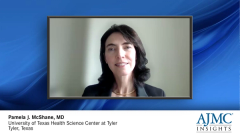
Complications Associated With Bronchiectasis
A medical expert highlights the impact of bronchiectasis diagnosis on quality of life for patients and their caregivers.
Episodes in this series

This is a video synopsis/summary of an Insights involving Mark Metersky, MD, FCCP, on the diagnosis of bronchiectasis.
Bronchiectasis complications include frequent exacerbations, interfering with quality of life for many patients. Bronchiectasis also increases risks of acute cardiovascular events like myocardial infarction, cardiac ischemia, and stroke from chronic inflammation, especially around exacerbations. Hemoptysis can occur and is usually self-limited, but sometimes it is severe enough to require interventions like bronchial artery embolization for significant frequent bleeds from inflammatory neovascularization.
Other potential complications are lung infections with nontuberculous mycobacteria like Mycobacterium avium complex, which require prolonged triple antibiotic therapy exceeding 1 year. Progressive respiratory failure is possible but uncommon.
Impacts on patients and families depends on disease severity. Patients seen at specialty centers often have moderate to severe disease with daily symptoms. The chronic cough can be exhausting, interfering with sleep and causing social isolation from embarrassment coughing in public. COVID-19 exacerbates this with fears of being perceived as infectious. Significant daily treatment burdens can include inhaled bronchodilators, mucolytics, airway clearance modalities, and inhaled antibiotics, with administration exceeding 90 minutes daily. High treatment burdens can lead to nonadherence. Families are also affected, witnessing disability and limitations in their loved ones.
In summary, bronchiectasis complications include frequent exacerbations, cardiovascular events, hemoptysis, nontuberculous mycobacterial lung infections, respiratory failure, and even death. However, most patients have slowly progressive symptoms without severely shortened life expectancy. Daily symptoms like exhausting cough can greatly impair quality of life. Intensive daily therapies also negatively impact patients and caregivers. Comprehensive supportive care and exacerbation reduction therapies are key to optimizing outcomes.
Video synopsis is AI-generated and reviewed by AJMC editorial staff.
Newsletter
Stay ahead of policy, cost, and value—subscribe to AJMC for expert insights at the intersection of clinical care and health economics.












